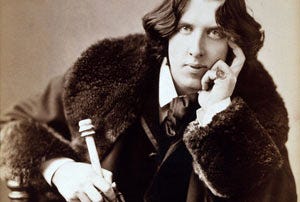✍️ I’m Writing in the Face of Doubt
or, How I Beat On, Boats Against the Current

Unless you’ve dug into F. Scott Fitzgerald’s biography, you may not know that he worked for a while in Hollywood. In fact, he died there. He was one of many famous writers like Dorothy Parker, William Faukner, and even Aldous Huxley who saw the writing on the screen – and the big bucks that movie writing could bring.

Fitzgerald certainly went for the easy money. His whole life, he had famously spent more than he made. In 1924, he wrote an article called, “How to Live on $36,000 a Year”, which is equivalent to about $675,000 USD in 2025. In 1937, he was making $1,000 USD per week, which gives you some sense of how easy the money actually was in Hollywood – almost a million a year today. It wasn’t just his lavish lifestyle though that demanded bank; his wife Zelda moved from sanatorium to sanatorium for schizophrenia treatments. Universal healthcare wasn’t a thing yet, and Swiss hospitals were expensive, even back then.
But many argue that Fitzgerald’s attitude towards Hollywood writing was better than some of the others’. By all accounts, he actually cared about what he was writing. A New York Times article details how a treasure trove of his personal papers from that time revealed how diligently he worked to hone his craft.
Still, it was mostly to no avail. Billy Wilder, a famous screenwriter and filmmaker from the time and friend of Fitzgerald, said that he was like “a great sculptor who is hired to do a plumbing job”. The NYT article concludes that “…some of Fitzgerald's romantic preoccupations changed very little over the years, and that the screen for which he couldn't help writing was always the printed page.”
Maybe that would have changed, too, if he lived longer.
I feel a strong kinship to this type of Quixotic jousting with words. I make a living from writing, so I’ve already won in my mind. But part of me yearns to write – and publish – a novel. That same part wonders, Am I a plumber trying to sculpt?
My Struggles with Doubt
I’ve mentioned my WIP struggles and successes here several times. I am not quite sure why the jump to novel writing is so difficult for me – but I have theories. Confidence is part of it. For some reason, I am less confident in my novel writing skills than my day-job writing.
Confidence is a tricky thing – you need confidence to write, but you don’t get confidence until after you’ve written. Even then, confidence is an ephemeral smoke that will blow away during the next wind. The best you can do is write unconfidently for the moment and endure the discomfort and doubt. Until one fine day…
I also wonder if my imagination is not what it used to be. As a kid, I’d daydream of flying into space or talking to flying hamsters who were from outer space (“Space” was a big thing for me, apparently) or stumbling on a chef in an alley who made the best soup in the world, but nobody knew about him. Not only did I daydream about things like this, I’d write them down. My first short stories started coming in at least Grade 3 and maybe Grade 2. My first (and last) songwriting came at age 6.
Today… well, I don’t have much time for daydreaming. Any time I do have is spent worrying about things I need to get done with work, family, home/yard/driveway, or otherwise. Have I lost that imagination muscle? Can I, perhaps, not take off in those flights of fancy as easily as before? To the point that when I sit down to write fiction, my mind’s eye doesn’t see as much, and the things I do see are blurry and desaturated?
Another thing I’m wrestling with is that maybe I see the world differently than other people. You usually hear that as a compliment: “Picasso saw the world differently, and we are the richer for it” or some such thing. You don’t hear about the other ones: “Graham saw the world differently, and we all shake our heads and think, WTF?”
I don’t think this is completely true – if it was, I wouldn’t be able to do my day-job writing. I seem to be able to connect with people through that kind of writing. More likely it’s that I get too cutesy in my fiction writing. I also make the reader reach too far. All the “Easter eggs” I had in my first novel that I thought would thrill and delight instead tended to confound and confuse. I learned the hard way that I need to be way less subtle. I need to allude to red by talking about a crimson cardinal, not a vague reference to a movie with Bruce Willis, Helen Mirren, and John Malkovich that came out 20 years ago to relatively little acclaim. (Oops, I did it again.)
Recently, a writer friend and I talked about writing. I complained longly and loudly about my inability to nail down the narrator’s voice. Which was really pissing me off, because it was a voice I should know well.
“What’s the voice?” she asked.
“Well, it’s like the voice I use in my Substack essays, but amped up.”
“Have you tried writing that voice without amping it up?”
No. No, I hadn’t. Genius. (Or, in this case, Jean-e-us.)
So, I tried that – and it’s working. I’m also employing all the other recipes I tout here: Zero Draft Writing, not worrying about what other people (or even I) will think of it, and not being too serious in my writing.
Specifically, what’s working is:
The characters are speaking for themselves, which is taking me new places.
The writing has little eddies of subtle, magical synchronicities, which I always take as a good sign.
I was happy when I re-read it later. It’s not perfect, but I’m not shooting for perfect at this point.
The writing is relatively effortless and fun. I don’t feel like I’m grinding gears on the voice or wobbling off the centre line with the story.
It’s still early, but these are all encouraging developments.
Face Doubt, Write Anyway
Fitzgerald wrote and rewrote many screenplays. Back then, it wasn’t uncommon for a script to go through multiple writers before it went to shooting. Sometimes, a line or two from Fitzgerald would survive. Mostly, they wouldn’t.
Most are forgotten movies, but some you’ll recognize like Gone with the Wind (apparently, that script contains 0% Fitzgerald). His lone official screen credit was for a movie called Three Comrades with a young Robert Young, who some of you may remember as Marcus Welby, MD.

This lacklustre performance is definitely not what Fitzgerald expected or hoped for. But it is a sign that he did finally get the hang of writing for the screen, not the page. Maybe he couldn’t “connect the pipes so that the water would flow” (as Billy Wilder put it) on a regular basis. But he did it once.
That’s the hope I hang on to as my pen ploughs through my own doubts.
Fitzgerald doubted himself at every turn, but he wrote anyway. His time in Hollywood teaches me that you don’t need to overcome doubt to write. You need to write despite doubt. It helps to remember that your doubts aren’t always right, anyway…
Key Takeaway: All writers face doubt, but it shouldn’t stop us from writing. Instead of focusing on overcoming your doubts, focus on writing despite them. In my experience, you’ll likely surprise yourself!
Over to You: Doubt or No Doubt?
How do you deal with doubt? Do you wait to write until it dissipates? Or do you write anyway? Let us know in the comments below!
I’ll leave you with the “official video” for New Order’s Doubts Even Here. Visually, I (ahem) doubt there is a more boring official video out there in the history of rock music. But the song is good, and it fits the theme perfectly.
Until next time... keep writing with wild abandon!
~Graham
email me if you get lost.





A novel ... yes ... For years I was comfortable with short stories and I thought that I'd never be able to sustain the length of book. Then I wrote 4 SF novels (it took me years, mind you) and decided that short stories were behind me. I jumped into a crime book, loved it, wrote it in a daze, edited, then sent it on submissions... No bites, for months, for years ... I got pissed off and went back to short stories, mostly to keep my motivation going. It started slow but I got some published, then more. And I went back to writing a book, and 2, and 3. Number 4 was the first to get published, last year. All through this I kept doing shorts. I'm swinging both ways now, and it's doing wonders for the imaginative muscle. Because, guess what, the more words you get out, the more words are coming, and the ideas too. The kid is still in there, Graham! Go for it.
Keep banging on Graham!